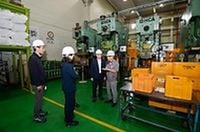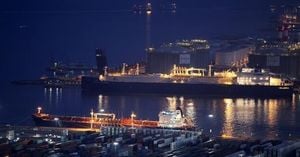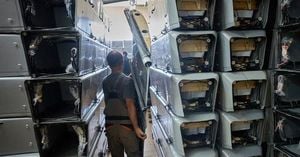On September 19, 2025, a sense of urgency and determination filled the air at the Ministry of Strategy and Finance as officials gathered to address the fate of one of South Korea's most ambitious infrastructure undertakings—the Hongtang-Osong 2nd phase development project. The project, which aims to expand a crucial railway corridor from two single tracks to four tracks (effectively two double tracks), has been suspended amid mounting concerns over illegal land use and construction permit violations, according to multiple reports including Yonhap News and Newspim.
The high-speed railway corridor between Pyeongtaek and Osong has long been recognized as a bottleneck in the nation’s transportation network. With trains frequently delayed due to limited track capacity, the need for expansion became glaringly apparent. The government’s plan to double the tracks was designed not only to increase transportation efficiency and punctuality but also to boost regional economies and enhance convenience for everyday rail users. As Yonhap News put it, the project is a "major national infrastructure development" with far-reaching implications.
But progress hit an abrupt halt this September. The Ministry of Strategy and Finance’s Reconstruction Office, led by key officials, convened a meeting to scrutinize the suspension of the project. The atmosphere was tense as the director and other senior figures voiced frustration over the illegal activities that had come to light. According to Newspim, the director “criticized the illegal activities related to the project and emphasized the need for strict measures.” The violations—primarily unauthorized land use and improper construction permits—threatened not only the timeline but also the integrity of the entire project.
The project’s complexity cannot be overstated. It involves a mix of construction challenges, regulatory hurdles, and the ever-present demand for transparency and legality in public works. As noted by Yonhap News, the Ministry was adamant that the project must proceed “without increasing the budget,” aiming for completion by 2028. This resolve was echoed by An Sang-yeol, the Ministry’s Fiscal Management Officer, who visited the construction site at Cheonan-Asan Station. There, he met with officials and project managers to discuss the current situation and the path forward.
During the site visit, An Sang-yeol underscored the broader significance of the project. “Projects like the Pyeongtaek-Osong double-track expansion breathe new life into local economies and the construction industry, greatly enhancing public convenience,” he said, as reported by Sisa Ilbo. “Timely execution is more important than anything else.” He then issued a clear directive: “Make sure the section opens as planned in 2028 by pushing forward thoroughly.”
The financial stakes are significant. The project received a boost this year through two rounds of supplementary budgets, each adding 100 billion won. Yet, despite these injections, the Ministry has made it clear that no further increases are on the table. The focus now is on optimizing the existing budget, plugging regulatory gaps, and ensuring every won is spent appropriately. “The office plans to supplement the project without increasing the budget by the year 2028,” Sisa Ilbo reported, highlighting the government’s commitment to fiscal discipline even in the face of setbacks.
The suspension has not just been a bureaucratic affair. On September 18, 2025, the Ministry’s Reconstruction Office branch in Gyeonggi Province, Kimpo City, held a separate meeting to coordinate with local government officials. The aim was to resolve the thorny issues of illegal land use and to ensure that proper project management protocols were in place moving forward. According to Newspim, “measures were discussed to prevent illegal activities and ensure smooth project progress.” It’s a reminder of how national infrastructure projects often hinge on local cooperation and meticulous oversight.
The project’s pause has also prompted a broader discussion about enforcement and accountability in South Korea’s construction sector. The Ministry has stressed the importance of “strict enforcement against illegal activities to ensure proper project development,” as reported by Yonhap News. This stance is seen as both a warning and a promise: that future projects will not be allowed to proceed under a cloud of impropriety, and that those responsible for violations will be held to account.
Despite the current suspension, optimism remains. The Ministry’s stated goal is to resume construction as soon as the legal and regulatory issues are resolved. The hope is that, by 2028, the expanded railway will be up and running, delivering on promises of improved efficiency, reliability, and convenience for millions of passengers. “The project is expected to be completed by 2028 without additional budget increases,” Yonhap News confirmed, reflecting the government’s determination to see the project through.
But what does this all mean for the average commuter or local business? In the short term, delays may cause frustration, especially for those who rely on the railway for daily travel or for moving goods. Yet the long-term benefits—a more robust transportation network, reduced congestion, and economic growth—are hard to ignore. The expansion is poised to transform not just how people move, but how regions connect and prosper.
Meanwhile, the Ministry has been keen to show its commitment to broader economic revitalization. On the same day as the project review, Deputy Prime Minister and Minister of Strategy and Finance Koo Yoon-chul visited a bustling street market in Daejeon’s Jung-gu district. There, he listened to local merchants’ concerns and discussed efforts to boost regional tourism and support small businesses ahead of the Chuseok holiday. This outreach, reported by Newspim, underscores the government’s dual focus: pushing forward with large-scale infrastructure while also tending to the needs of local economies.
The Hongtang-Osong 2nd phase development project’s journey is far from over. Its suspension has exposed vulnerabilities in project management and regulatory compliance, but it has also spurred a renewed commitment to doing things right. As An Sang-yeol put it, “Thorough execution is essential to ensure the project opens as planned in 2028.” The coming months will be crucial as officials work to resolve outstanding issues, restore public trust, and get the trains—quite literally—back on track.
For now, all eyes are on the Ministry of Strategy and Finance as it navigates the challenges ahead, determined to deliver on its promises without overspending or cutting corners. The outcome will not only shape the future of South Korea’s transportation infrastructure but also set a precedent for how the nation handles its most ambitious public works projects.





